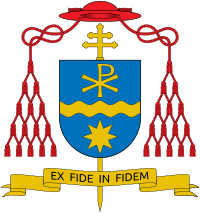António Ribeiro facts for kids
Quick facts for kids His Eminence Antonio II |
|
|---|---|
| Cardinal, Patriarch of Lisbon | |
| Church | Roman Catholic |
| Archdiocese | Lisbon |
| Enthroned | 1971 |
| Reign ended | 24 March 1998 |
| Predecessor | Manuel Gonçalves Cerejeira |
| Successor | José Policarpo |
| Other posts | Cardinal-Priest of Sant’Antonio da Padova in Via Merulana |
| Orders | |
| Ordination | 5 July 1953 |
| Consecration | 17 Sep 1967 |
| Created Cardinal | 5 Mar 1973 |
| Rank | Cardinal-Priest |
| Personal details | |
| Born | 21 May 1928 Gandarela de Basto, Portugal |
| Died | 24 March 1998 (aged 69) Lisbon, Portugal |
| Buried | Monastery of São Vicente de Fora |
| Nationality | Portuguese |
| Coat of arms |  |
| Styles of António Ribeiro |
|
|---|---|
 |
|
| Reference style | His Eminence |
| Spoken style | Your Eminence |
| Informal style | Cardinal |
| See | Lisbon |
Dom António II Ribeiro (born May 21, 1928 – died March 24, 1998) was an important Portuguese cardinal in the Roman Catholic Church. He served as the Patriarch of Lisbon from 1971 until his death in 1998.
Contents
Who Was Cardinal António Ribeiro?
António Ribeiro was a highly respected leader in the Catholic Church in Portugal. He became a cardinal, which is a very high rank, and led the church in Lisbon for many years. He was known for his strong beliefs and his efforts to support the Church.
Early Life and Education
António Ribeiro was born in São Clemente de Basto, Celorico de Basto, Portugal. His parents were José Ribeiro and Ana Gonçalves. He became a priest on July 5, 1953, in Braga.
He studied theology at the Pontifical Gregorian University in Rome. He also taught at the Superior Institute of Catholic Culture. In 1959, he wrote his doctoral paper about the ideas of Saint Thomas Aquinas. He continued his studies in Braga and attended theological schools in Innsbruck and Munich.
A Voice on Television
In 1960, António Ribeiro started a television program called Dia do Senhor (The Lord's Day). This show helped him share religious messages with many people. He also wrote for several religious magazines and newspapers.
Leading the Church
In 1971, António Ribeiro became the Patriarch of Lisbon. This made him the main leader of the Catholic Church in Lisbon. The next year, he was also made the Vicar Apostolic for the Portuguese Military.
On March 5, 1973, Pope Paul VI made him a cardinal. He was only 44 years old, making him one of the youngest cardinals at that time. He attended the meetings in 1978 where new Popes were chosen. In 1991, he was sent by the Pope to a special celebration in Luanda, Angola.
A Strong Leader
Cardinal Ribeiro was known for being a person who could find common ground. However, he was also very firm in protecting the rights of the Church in Portugal. He worked hard to make sure the Church's role in the country was respected.
His Legacy
António Ribeiro passed away from cancer in Lisbon in 1998, just before his 70th birthday. He is buried in the tomb of the patriarchs at the Monastery of São Vicente de Fora. He helped consecrate (officially appoint) José da Cruz Policarpo in 1978, who later became his successor as Patriarch. He also consecrated Januário Ferreira in 1989.
See also
 In Spanish: António Ribeiro para niños
In Spanish: António Ribeiro para niños
 | Madam C. J. Walker |
 | Janet Emerson Bashen |
 | Annie Turnbo Malone |
 | Maggie L. Walker |

